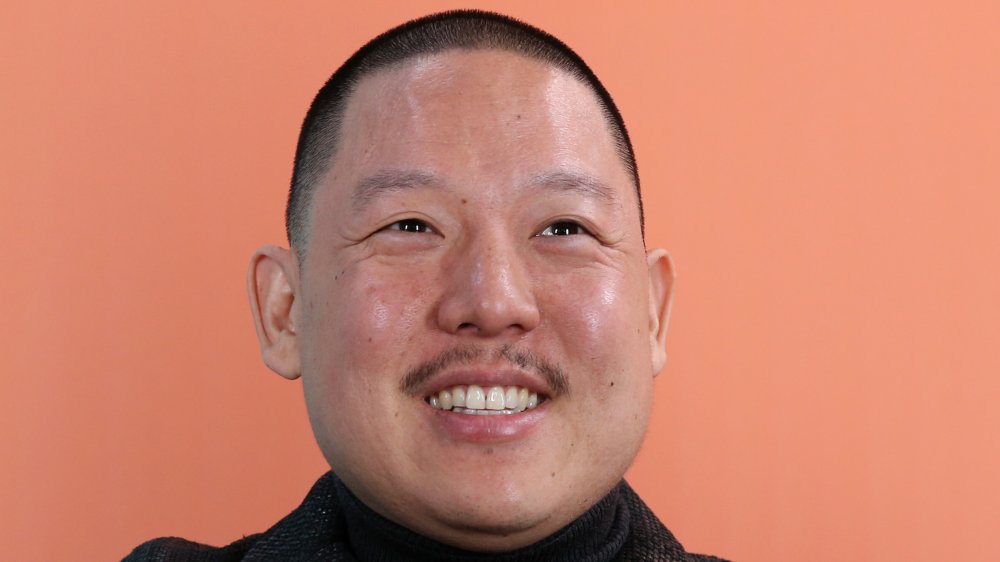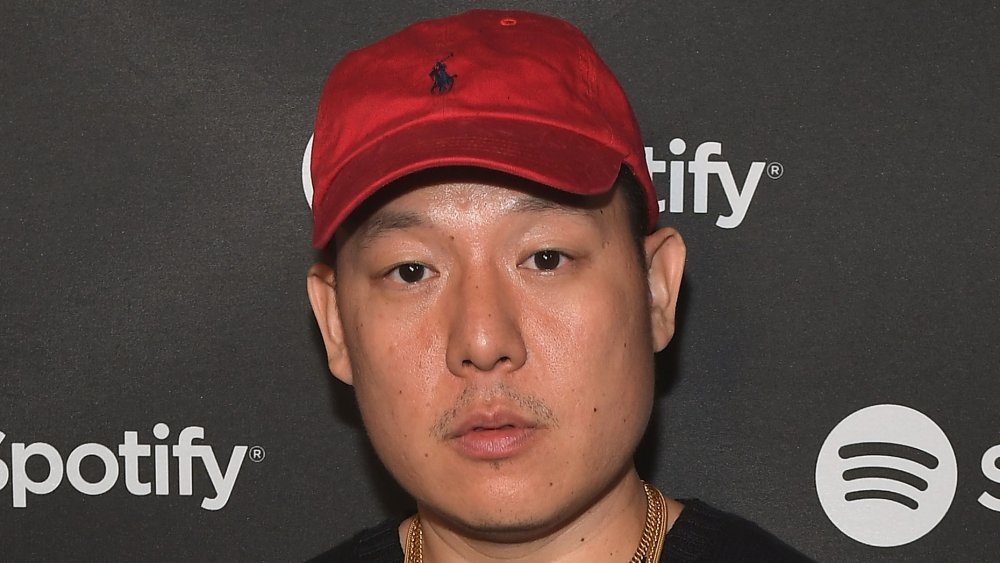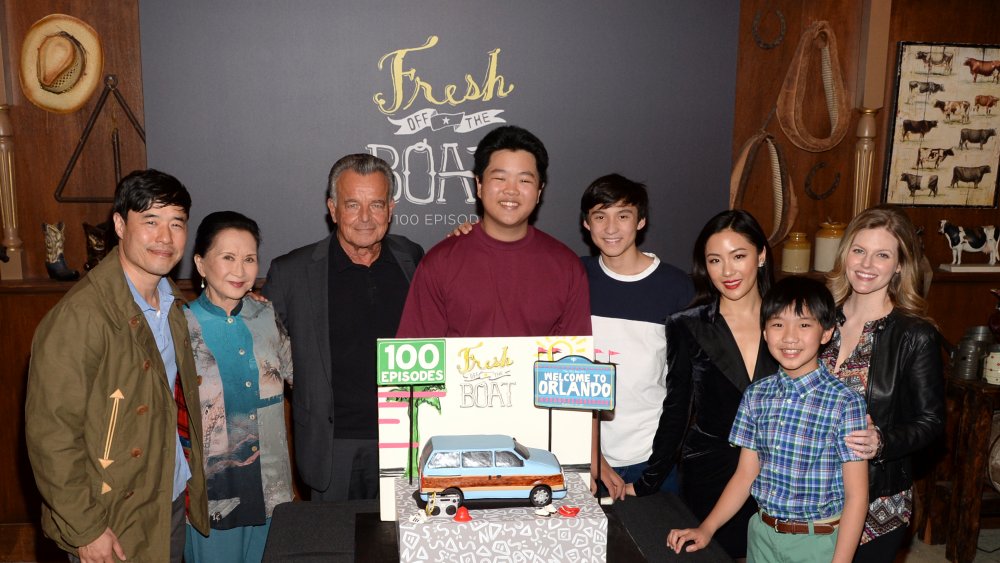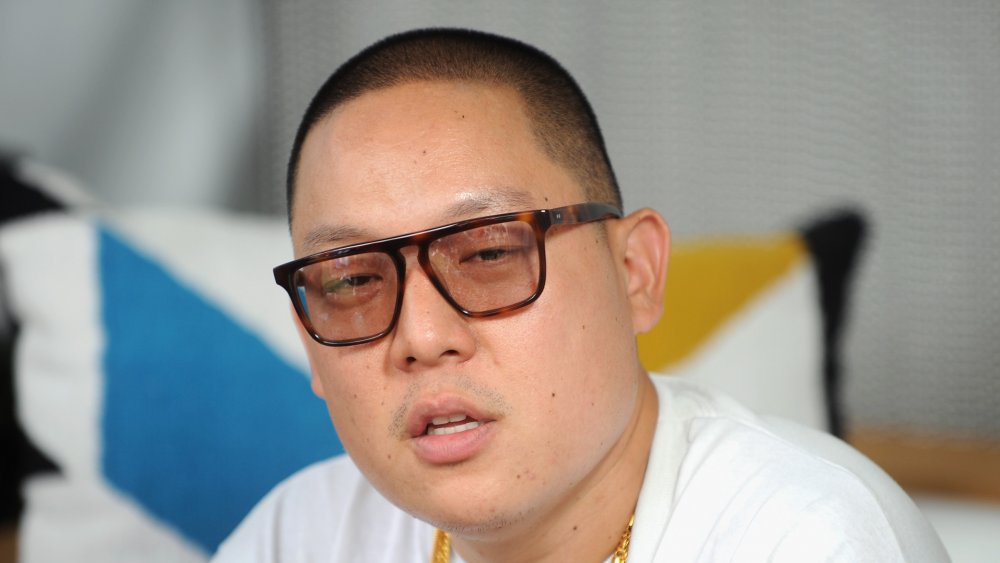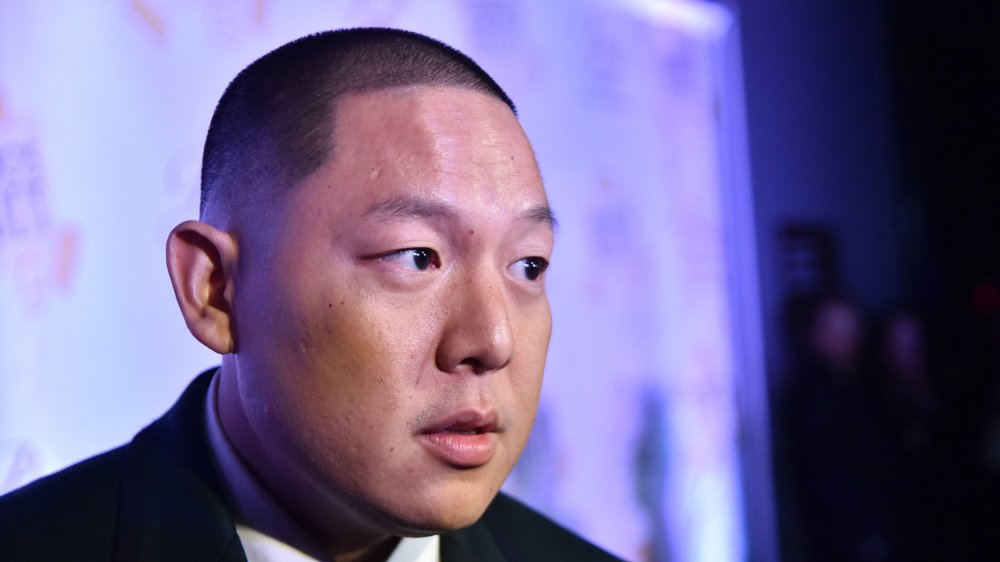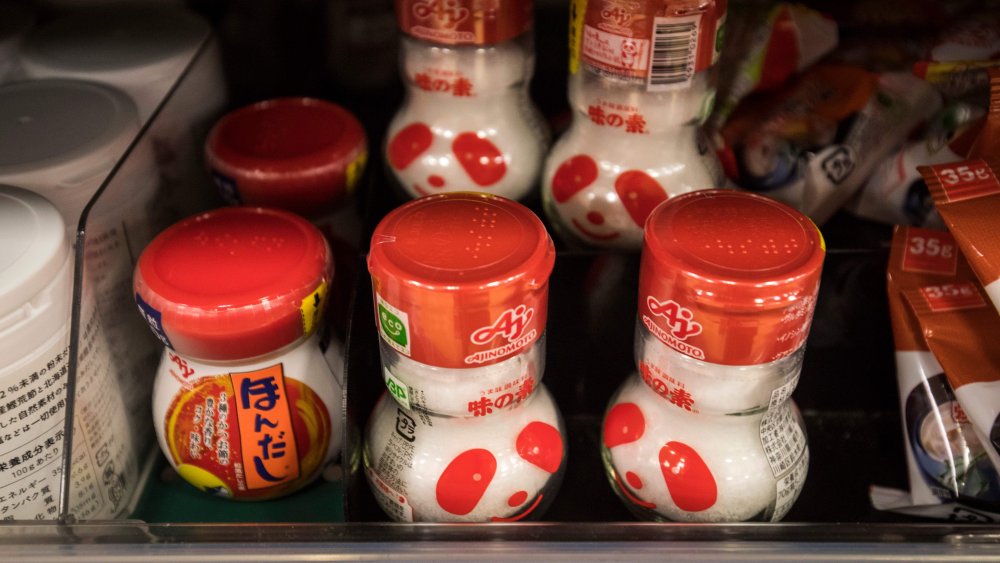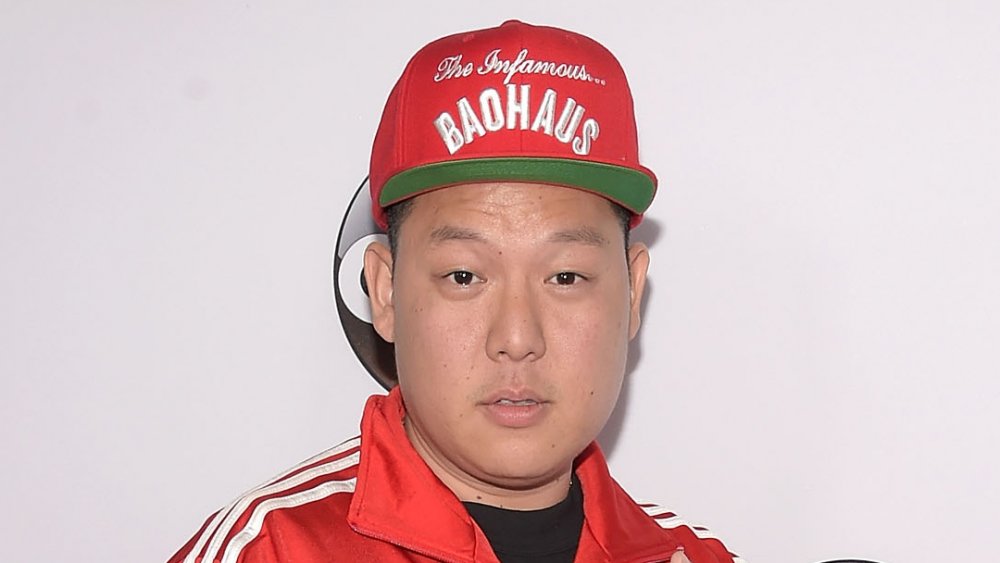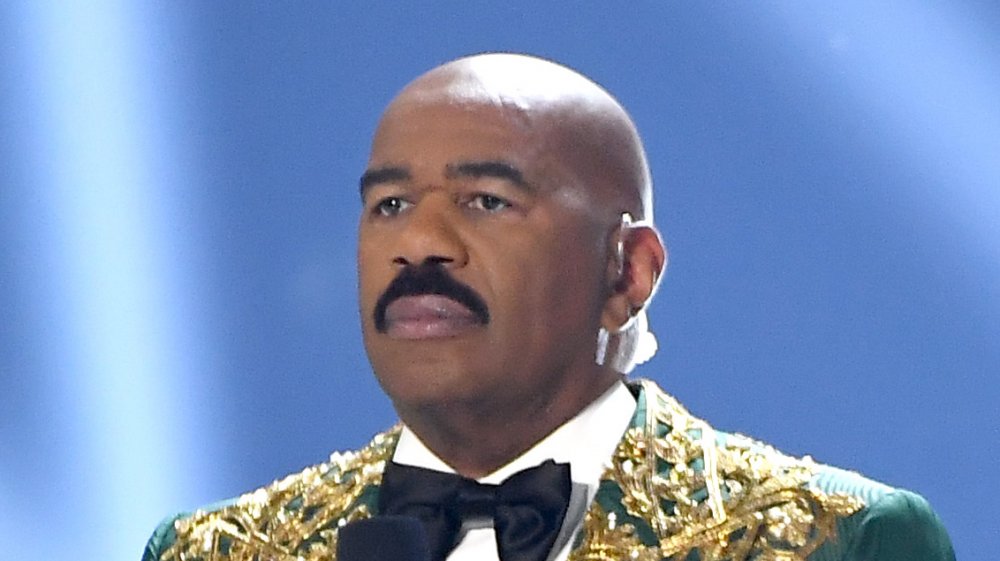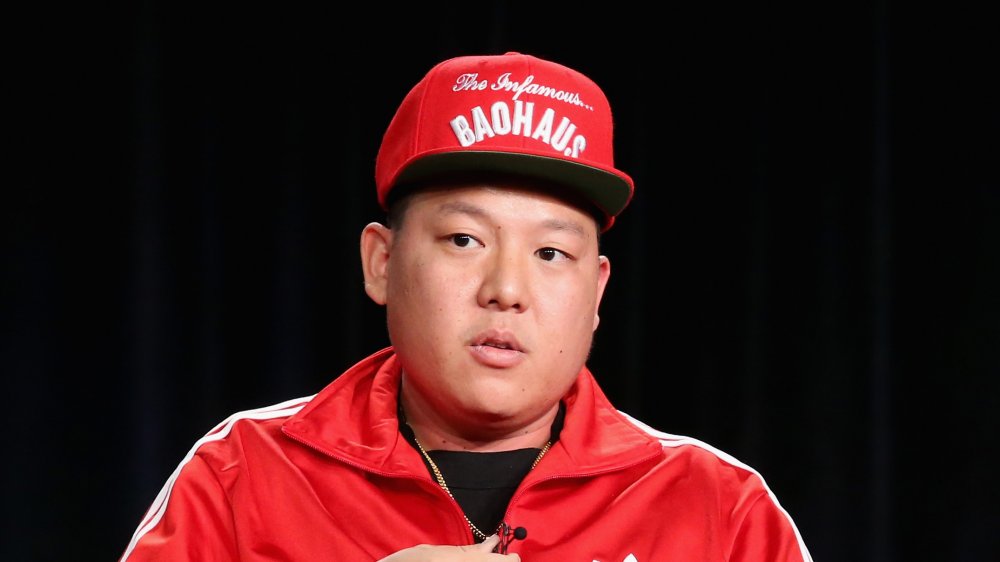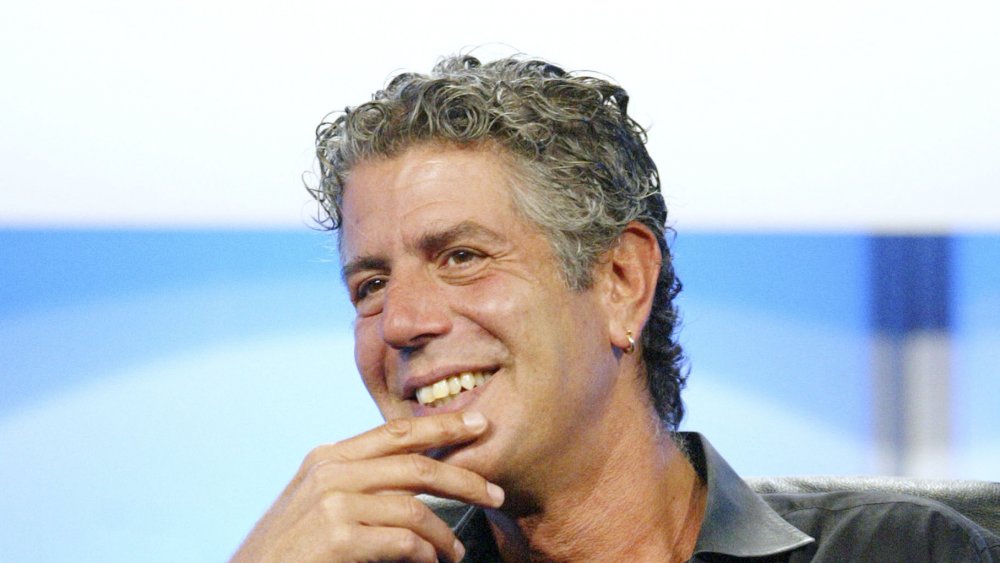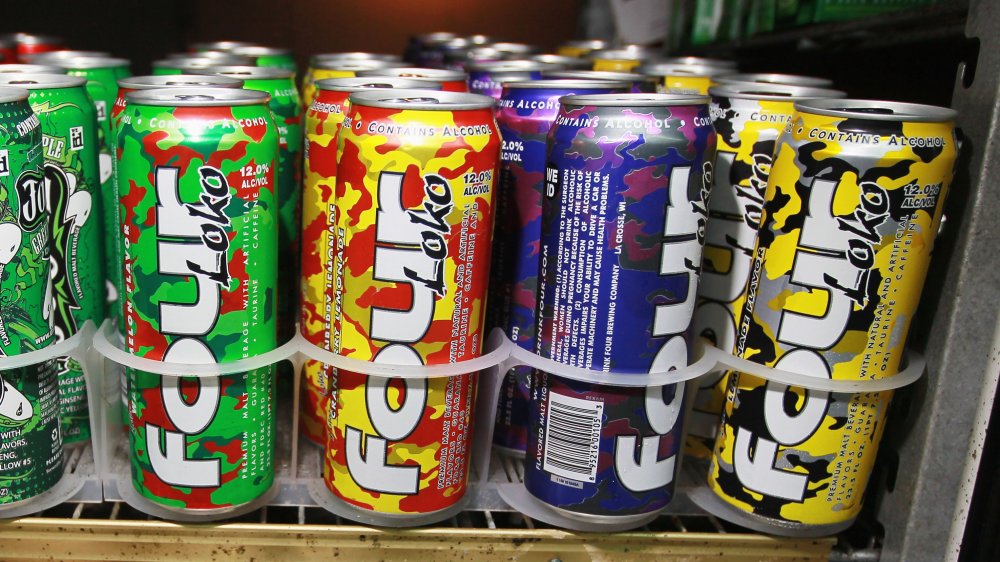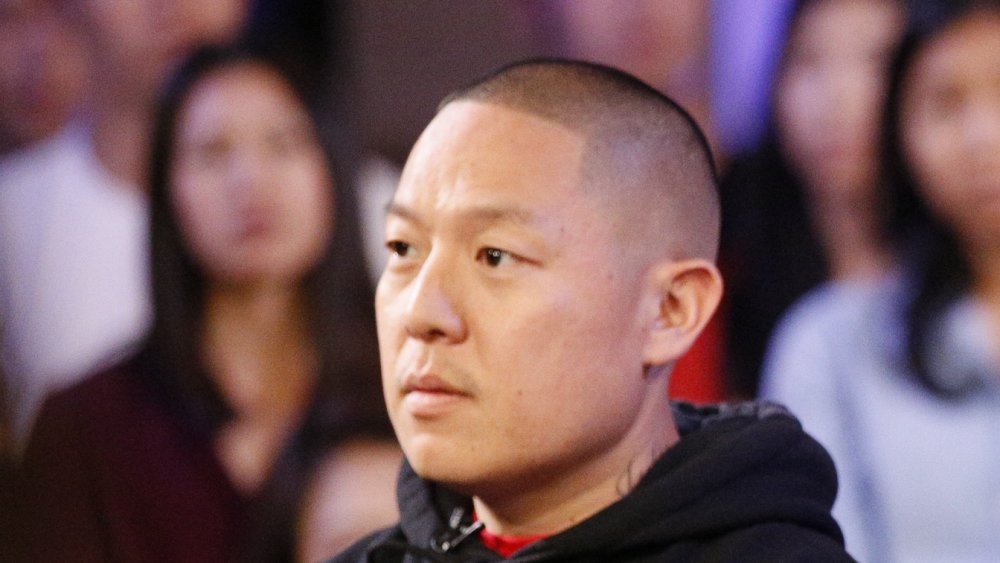The Untold Truth Of Eddie Huang
When you think about celebrity chefs, who does your mind wander to? Julia Child? Ina Garten? Bobby Flay? Or some other established, white, television chef? Well, you might want to broaden your knowledge a little bit and learn about some of the new chefs in town. These young cooks are bringing a whole new outlook to the world of food, infusing the culinary scene with their unique perspectives, flavors, and personalities. One person you should definitely keep your eye on? Eddie Huang, the chef at Baohaus.
Huang isn't just a chef, though he is famous for the creative gua bao (Taiwanese steamed buns) he serves up at his restaurants in New York and Los Angeles.
He's also a prolific essayist, memoir writer, television host, and cultural critic. Huang isn't afraid to shake things up, and he doesn't hesitate to speak out about things that are important to him, from exposing cultural erasure and reflecting on the immigrant experience, to talking about his love for hip-hop and basketball and back again.
Curious? We thought so. Here's everything you should know about chef Eddie Huang.
Eddie Huang was a victim of childhood sexual assault
The era of "Me Too" hasn't left the restaurant industry untouched, with revelations that formerly idolized culinary stars like Mario Batali allegedly sexually assaulted and harassed women.
But men aren't just the perpetrators of these assaults — they're also the victims. We hear about male victims of assault in the restaurant industry much less often than we hear stories from women working in the industry, but in 2017, Eddie Huang revealed that he was a survivor of childhood sexual assault.
In an essay for The Cut, the chef revealed that when he was 14, he was sexually assaulted on a church ski trip by a chaperone. He told a handful of close friends years after the incident happened, but it took him nearly two decades before he went public with his story.
It took 20 years for Huang to go public with the incident, which he said he did after the stories about Harvey Weinstein made him think about his own assault experience, and after being inspired by actor Anthony Rapp coming forward about his alleged assault by Kevin Spacey when he too was just 14.
"We can't always control what people do to us, but we do have the power to define it," Huang wrote in his essay.
The show Fresh Off the Boat was based on Eddie Huang's memoir
Even if you aren't familiar with Eddie Huang because of his restaurant Baohaus and his culinary career, there's a chance you know a thing or two about his life. That's because the hit sitcom Fresh Off The Boat, which was recently canceled after its sixth season, is based on Huang's memoir of the same name.
Huang's memoir was about his experience as a Taiwanese-American kid with immigrant parents. The book, much like the show, chronicles his family's move from Washington, D.C., to Florida; showcases young Eddie's love of hip hop; and explores his family's dynamics as they struggle to adapt to suburban life.
Fresh Off the Boat was the first television series starring an Asian American cast to air in more than two decades, starring Randall Park and Constance Wu, now major stars.
Though the show was groundbreaking, not everyone was pleased with its representation of Asian American life. In fact, Huang himself has made more than a few statements about his displeasure with how the show has interpreted his family's story.
Eddie Huang wasn't a fan of the Fresh Off the Boat show
Picture this: you've written a memoir, it becomes a best-seller, and suddenly, it's being optioned for a TV show. It sounds like a dream come true, right? Well, Eddie Huang might have a thing or two to tell you about the realities of having a deeply personal work of non-fiction being adapted into a network-friendly sitcom.
In fact, his analysis of the show is pretty harsh. Of the show's executive producer, Melvin Mar, Huang said that he seemed to "forget that successful people of color are in many ways 'chosen' and 'allowed' to exist while the others get left behind."
Of the head writer and executive producer Nahnatchka Khan, he asked "why isn't there a Taiwanese or Chinese person who can write this? I'm sure there's some angry Korean dude in Hollywood who grew up eating Spam, watching his dad punch his mom in the face, who knows how to use Final Draft!"
Finally, he said that while he did "[feel] some truth in it," he explained that, "This show isn't about me, nor is it about Asian America. The network won't take that gamble right now."
Huang made these statements before the show aired, but a year later he seemed to have softened to Fresh Off the Boat, if only somewhat. "It's a gateway [to Asian-American culture]... I don't watch it, but I'm proud of what it does," he said in conversation with Constance Wu in 2016.
Eddie Huang is going to direct a feature film
Fresh Off the Boat isn't Huang's only experience in the entertainment world. He was a host of the Cooking Channel show Unique Eats, was the host of the MTV's cooking competition show Snack-Off, hosted the Viceland international travel series Huang's World, and appeared on an episode of Anthony Bourdain's show The Layover.
But he's not just sticking to the world of television, nor is he keeping his writings in the realms of books, magazines, and websites. In August of 2019, it was announced that Huang would direct Boogie, a feature film he also wrote. The movie is a coming-of-age story about a Chinese-American basketball player in New York City. Much like Huang himself, the main character in the film is the child of immigrants, and like Huang the main character has a passion for basketball and dreams of someday playing in the NBA. The story focuses on the main character's attempts to balance his desire to play pro ball with his parents' expectations.
The film, which was shot in New York, is currently in post-production, though no release date has yet been announced.
Eddie Huang likes to cook with MSG
Few ingredients are more controversial in the American kitchen than MSG, or monosodium glutamate.
MSG is a food additive that enhances the savory, umami flavor in foods. But for years, Americans have claimed it can cause side effects like headaches, chest pains, and more. There's even a term for these side effects — Chinese Restaurant Syndrome — which chef Eddie Huang has recently pointed out is a racist term that reflects white Americans' prejudice towards foods from other cultures more than it does any scientifically backed evidence that the MSG present in Chinese food can actually cause adverse effects.
Huang feels so passionately about dispelling the myths and rumors around this ingredient that he recently teamed up with Ajinomoto, a company that makes MSG, to educate diners about the product and its uses.
Not only does the FDA include MSG as an ingredient that is "generally recognized as safe," but numerous scientific studies have also shown that there's no link between MSG and the symptoms of the alleged syndrome. Furthermore, MSG is found in many other foods (Parmesan cheese, Popeyes chicken, Doritos) that no one seems to complain about.
Huang starred in two videos that address bias toward MSG on Instagram, and he is firm in his belief that this is one ingredient that gets a bad rap for no good reason.
Eddie Huang was arrested in Sicily for standing up to racists
Huang is no stranger to conflict, whether he's speaking out against a show based on his own memoir, dispelling racist myths about MSG, or, it turns out, trying to reason with right-wing extremists in Italy. Wait, what?
In 2016, Huang traveled to Italy to film an episode of his Viceland TV show Huang's World. He was dining with members of Forza Nuova, a far-right group. Huang was attempting to talk to them about cross-cultural food influences, but when he shared with them that some of their most beloved Sicilian foods, like arancini, pistachio gelato, and sesame seeds are actually inspired by foods or made with ingredients from North Africa, the members of the group became angry. A passerby chimed in and took Huang's side, but that encouraged one of the Forza Nuova members to try to initiate a fight. Eventually, the cops were called, and Huang and his crew were sent to jail.
Luckily, according to Huang his experience in Italian prison wasn't exactly harrowing. While waiting for the US Embassy to work their magic to release the chef, the curious cops were asking Huang to explain how to make a real hamburger, and he apparently enchanted them with tales of Carl's Jr.'s $6 drive-thru burger. Hey, whatever it takes to pass the time behind bars!
Eddie Huang is not a fan of Steve Harvey
Eddie Huang may have famously feuded with the creators of Fresh Off the Boat, the sitcom based on his memoir, but those aren't the only big players in the world of entertainment he's exchanged words with.
Huang spoke up with strong words after hearing Steve Harvey tell a joke about Asian men that was undeniably racist.
Steve Harvey was making jokes on his talk show, and referred to a fictional dating book called How to Date a White Woman: A Practical Guide for Asian Men. Harvey's so-called joke? "That's one page. 'Excuse me, do you like Asian men?' 'No.' 'Thank you.'"
Unfortunately, his crude joke didn't stop there — he had a follow up that was just as rude and prejudiced.
Huang was understandably upset by the racist jokes, and he used his platform to speak up. He said that the joke hit him particularly hard because "the one joke that still hurts, the sore spot that even my closest friends will press ... is that women don't want Asian men ... Asian men are told that regardless of what the idyllic mirepoix is or isn't, we just don't have the ingredients."
He went on to say that Harvey has a huge platform and said that while Harvey "speaks openly about issues facing the black community" and is a man of God, "For his own personal profit, he's willing to perpetuate the emasculation of Asian men regardless of how hypocritical it is."
Eddie Huang was once engaged, but it fell apart
Being a celebrity chef and maintaining a relationship is hard. Just look at Food Network stars Bobby Flay, Giada de Laurentiis, The Neelys, and Alton Brown — all divorced.
Unfortunately, Huang has been similarly unlucky in love. He writes about his relationship with his now-ex, Dena, in his second memoir, Double Cup Love: On the Trail of Family, Food, and Broken Hearts in China.
Huang details how he decided to travel to China to cook for the people there, to see how his Chinese-Taiwanese-American food would be accepted.
Initially, he planned to have Dena meet him halfway through the trip, and he also planned on doing something big when she arrived — proposing.
Unfortunately, it seems like cultural differences got in the way of their relationship. When Huang called Dena's father to get his permission to propose, the father espoused some outdated, racially insensitive beliefs, and it seems to have cast a shadow over the duo's entire relationship. Huang did end up proposing, but their relationship dissolved 18 months later.
That wasn't the only problem. Huang wrote later, in a piece in New York Mag, about the end of their relationship. He says that "She couldn't take affirmative steps toward the things she wanted to do in life... I just kept pushing her toward her goals and eventually pushed her away."
Eddie Huang was friends with Anthony Bourdain
Huang is often regarded as a "bad boy" of the food world, someone who isn't afraid to speak his mind. It makes sense then that Huang, a prolific writer, would have found community with the late Anthony Bourdain, himself a talented essayist, entertainer, and "bad boy" voice in the culinary world.
In 2012, Bourdain spoke to the Observer about Eddie Huang, and most of what he said was undeniably praise-worthy. Bourdain said that he initially became a fan of Huang through his blog, and that it was his writing that drew him in long before he ever ate at Huang's BaoHaus.
In fact, it seems like Bourdain's fascination mostly had to do with being a fan of his cultural criticisms — when asked about Huang's cooking, Bourdain said "I don't know Eddie the cook, and I don't really know Eddie the restaurateur. It seems to me a smart operation with tasty little pork buns. Great."
When Bourdain passed away, Huang mourned along with the rest of the food world.
In an article for Rolling Stone, Huang detailed his respect for Bourdain. He talked about how influential Bourdain's No Reservations: Asia two-hour special was for him and his family, and praised the way he used food to bring people together.
"He was, is, and always will be the Michael Jordan, Hunter S. Thompson and Mick Jagger" of the food media world, according to Huang.
One of Eddie Huang's restaurants failed because they were determined to sell Four Loko
When you think about going to eat at a trendy New York restaurant, what do you imagine drinking? For most of us, it would probably be a nice glass (or bottle) of wine, a hyper-local micro-brew, or a fancy, mixologist-style cocktail. But Eddie Huang, never one to cave in to expectations, had other ideas at his restaurant Xiao Ye.
For those who don't remember, Four Loko in its original form was a high-gravity malt beverage that was also loaded with caffeine. It was eventually banned because it was thought to be too dangerous to drink — in fact, several people died after ingesting the drink. (It's since been reformulated and is available under the same name, now sans caffeine.)
Huang initially decided to host an all-you-can-drink Four Loko event at Xiao Ye, but after a lot of pushback, he canceled the event, deciding to serve Four Loko cans for $3 a pop.
Well, that wasn't something that the Liquor Authority liked. Huang says they raided Xiao Ye four times, destroying their inventory of Four Loko, sent undercover agents with fake IDs to order the drink, and fined the establishment.
Finally, fearing that they would lose their liquor license all together, Huang and his partner closed Xiao Ye.
Eddie Huang was a victim of domestic violence as a kid
The show Fresh Off the Boat hasn't tackled everything that Eddie Huang wrote about in his memoir of the same name, but it has explored some intense subjects, from racial slurs to the pressure to assimilate and more.
But one topic Huang wishes the show had explored more in-depth was something that affected his life in a major way — domestic violence.
"One of the biggest issues this country faces now... is domestic violence, and I lived it," Huang said in an interview.
"They tried to take my brother away and my parents away from my family because of domestic violence, and it's something I really struggled with as a kid," Huang said. "This is a big idea, and I feel like if we are going to talk about Asian families, it's something we should discuss and think about how we can address."
The show never really went there, and Huang thinks he knows why. "It's a very sitcomy show," he said, and it seemed like production wasn't as interested in pushing boundaries as Huang wishes they had been. "I think people are smarter than we give them credit for, and we should stop talking down to them."
